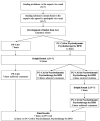Psychometric properties of comprehensive cognitive, affective, and psychomotor competency assessment scales in psychodynamic psychotherapy for borderline personality disorder
- PMID: 39713768
- PMCID: PMC11659780
- DOI: 10.3389/fpsyt.2024.1389992
Psychometric properties of comprehensive cognitive, affective, and psychomotor competency assessment scales in psychodynamic psychotherapy for borderline personality disorder
Abstract
Background: Psychodynamic psychotherapy is a type of psychotherapy for individuals with borderline personality disorder (BPD). However, competency in conducting effective psychodynamic psychotherapy for BPD is difficult to evaluate. Therefore, this study aimed to identify the psychometric properties of a comprehensive scale to assess cognitive, affective, and psychomotor competencies (CS-CAPC) in psychodynamic psychotherapy for BPD.
Methods: This is a qualitative study. The first step used the Delphi technique to gather experts' opinions on the cognitive, affective, and psychomotor competencies necessary to conduct psychodynamic psychotherapy for BPD. The experts comprised three psychotherapists, seven psychiatrists with experience in psychotherapy, and nine teaching staff. A panel discussion was conducted to obtain qualitative data. Thematic data analysis was adopted, and content validity testing was used to analyze the content validity of the CS-CAPC in psychodynamic psychotherapy for BPD.
Results: The CS-CAPC comprised two scales assessing two specific competencies in psychodynamic psychotherapy for BPD: The first scale, the psychodynamic formulation competency assessment scale (PF-CAS), comprised six items, including the case description, etiology, and potential course of therapy. The second scale, the practical-competency assessment scale (PC-CAS) for psychodynamic psychotherapy for BPD, comprised 12 items, including building a therapeutic alliance, performing psychodynamic interventions while working through the therapeutic process, and closing the session. The scale-level content validity index (S-CVI) for the PF-CAS was 0.981, and that for the PC-CAS in psychodynamic psychotherapy for BPD was 1.00.
Conclusion: The CS-CAPC in psychodynamic psychotherapy for BPD had good validity in assessing individual competency in the cognitive, affective, and psychomotor domains.
Keywords: assessment scale; borderline personality disorder; psychodynamic psychotherapy; psychometric; validity.
Copyright © 2024 Lukman, Wiguna, Soemantri, Menaldi, Elvira, Sutanto, Sapiie, Kekalih, Noviasari, Rizki and Giyani.
Conflict of interest statement
The authors declare that this study was conducted without any commercial or financial relationships that could be construed as potential conflicts of interest. The author(s) declared that they were an editorial board member of Frontiers, at the time of submission. This had no impact on the peer review process and the final decision.
References
-
- Chapman J, Jamil R, Fleisher C. Borderline personality disorder. Treasure Island: StatPearls Publishing; (2022). - PubMed
-
- Dr. Cipto Mangunkusumo National Central General Hospital . Patient Registry of the Psychiatric Outpatient Clinic and Inpatient Ward. Jakarta: Dr. Cipto Mangunkusumo National Central General Hospital; (2022).
LinkOut - more resources
Full Text Sources


